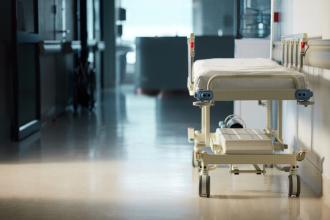My pandemic fears
31 March 2020
By the time this editorial, written at the end of March, makes it to print, it will be hopelessly out of date. I hope that my fears today do not become our reality when this is read in the May issue of the BCMJ. Thanks to the COVID-19 pandemic, today’s reality for many front-line physicians consists of virtual office visits, virtual meetings, virtual contact with friends and loved ones, and virtually being on the edge of panic every day.
We physicians in this province have been told to keep our heads down, to keep calm, and to not publicly disagree with the official statements coming from the various levels of government and the medical profession’s representative and regulatory bodies with regard to the COVID-19 pandemic. I understand the logic behind this message; they don’t want the public to panic. The unintended consequence is that many health care providers are currently in a state of panic. Those of us who are exposing ourselves daily to people who could potentially make us very sick or even kill us are feeling very stressed. It doesn’t help when we know that things are worse than they are being made out to be. It doesn’t help when the news from Italy is of civil unrest and the news from New York is that refrigeration trucks are being used to store bodies. It doesn’t help when the news from our international colleagues is that even though they took all the necessary protective measures, they too are getting sick with COVID-19. It doesn’t help that we feel as though we may run out of personal protective equipment. It doesn’t help when the published statistics of confirmed cases of COVID-19 do not take into account that we stopped testing the general population 2 weeks ago. Of course, the number of confirmed cases will appear to be fewer if you change your testing criteria.
In my opinion—shared by epidemiologists and infectious disease specialists throughout the world, and annunciated by the World Health Organization—the keys to containing this disease are rigorous testing and contact tracing, strict controls on people’s movement (border controls and social distancing), and enforced quarantine of high-risk individuals. Unfortunately, we stopped testing widely, and the controls on people’s movement were perhaps 1 or 2 weeks too late, and they are too weak.
During the early stages of the pandemic in BC, the physicians with whom I work were aware of community spread of the disease several days before it was announced officially. During the early stages of the pandemic in BC, some staff were wearing masks at all times in the hospital (not only during patient contact), but they were reprimanded by hospital administration for doing so. A couple of weeks later, we were told by the same people that it was advisable to wear a mask at all times in the hospital. Last week, I had hospital rounds for my group. My daily ritual after hospital rounds was to shower and change clothes and shoes before going to my office. I now wear a mask and eye protection all the time when I am in public or at work. Many physicians in our hospital had to buy eye protection for themselves, as I did. I clean my hands multiple times a day. Yet, I fear that is not enough to avoid getting the virus. Today, without any obvious stimulus, my fear ramped up to such a high level that I imagined this editorial to also be my obituary.
If this pandemic can be likened to a war, and health care workers are the army, then it feels as if we are being sent into battle without bullets and without adequate body armor.
I apologize to readers for the gloomy nature of this editorial, and I apologize to those trying to keep everyone calm. The only mitigating factor, perhaps, is that by the time you read this my words will either seem hopelessly pessimistic and overdramatic, or the situation will be much worse and these words will seem calm compared with how everyone is actually feeling. I hope it’s the former.
—David B. Chapman, MBChB

